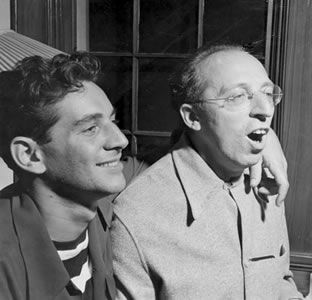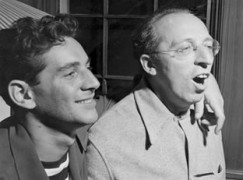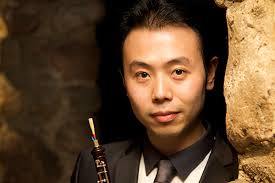So, Aaron Copland, what do you owe to Schoenberg?
mainThe person asking the question is Glenn Gould.
Copland waffles and waffles and waffles.
Just watch.


The person asking the question is Glenn Gould.
Copland waffles and waffles and waffles.
Just watch.

The Mozart concerto due to be played three…

The Manhattan School of Music this morning quietly…

The tenor Ian Bostridge shocked Symphony Hall Birmingham…

The orchestra’s president Gary Ginstling has engaged Katya…

Session expired
Please log in again. The login page will open in a new tab. After logging in you can close it and return to this page.
Not as much as he owed to Boulanger?
Very interesting.
It might be helpful to quote from an interview that Debussy gave in the twenties:
“I never understood why awarenes of all the notes we have should produce such ugliness… And why have they to be ordered in a row, like courgettes at the market place? When we begin the cooking process we try to get it tasteful. In my Jeux I was much aware of chromaticism, exploited it to the full, but made sure the result was gourmet beauty. You can use any material but it’s your taste that makes it digestible.”
Unless the history books have got it very wrong, Debussy died in 1918. A voice from The House of Usher perhaps? Or are you confusing him with Ravel?
it was a very late interview.
Which spirit medium transcribed this interview? 😉
Source for the quote? Debussy died in 1918.
‘Debussy et Gourmandise: Lettres et Confessions’, Editions Fugitives, Paris 1926
Fairly incisive answer from Copland.
“12 tones without repetition”
This is widely misunderstood as pitch repetition is by no means unallowable. Bar 2 of the Schoenberg Suite and the repeated Bflats for instance.
It always hinders me when I hear repetitions in 12-tone music. The point is to get confused!
Sally
Seems to me he is trying his best to give an answer to a daft question which says much more about the pianist asking it than the composer answering it!
Thank you Aaron
https://www.youtube.com/watch?v=njsV6YiAVro
Copland begins wafflingly but gets around to some reasonably substantive — and substantially reasonable — statements, in my opinion. It’s interesting that he cites Schoenberg’s influence on his chordal (vertical) practice, when one is accustomed to thinking of Schoenberg as a composer of contrapuntal (horizontal) music.
I find it especially informing that Mr. Copland explains how when those, whoever he’s talking about, find out that atonalism isn’t just about expressionism, that it took a new turn, whatever that turn was called, which we all would want to know by now but aren’t given the tag for. I mean that’s really amazing, that that’s the new main trend. And it wasn’t that people just did their own thing with it, it was…..
But isn’t Mr. Copland involved with academics, and isn’t that what mainly goes on there? What I don’t understand is that in this day and age we have synthetic intelligence programs that can scan the web for relevant information and put together the same kind of “breakfast” we get here. No need for actual teachers anymore. Modern students can instead be amazed by the proliferation of information from modern technology.
In fact, whenever a celebrity does an interview, it could be from such a program, since they all need their personal space, which would give them more time for that. So when ever Barbara Streisand, Brad Pitt, Joshua Bell, Renee Fleming, Lang Lang, or anyone expected to have interesting enlightening and morally gratifying things to say is to do an interview, they could just press a button and out would come…..
“Heh, George, they want another inteview with Lang Lang, shall we get out the cool and suave version or the happy and chipper one?”
I can’t imagine why you think he is waffling. He gave many specific examples.
An alarmingly superficial comment. This is not waffle! Everything Copland says is carefully considered and very much to the point.
I disagree. AC goes on to list and explain in some detail what he thinks he owes to S. that seems to me to be quite a thorough answer to the question.
In what way is this waffle?
I don’t hear it as waffling. He is detailed, patient and painstaking.
It’s a psychological trick . If the headline had read ” intelligent answer from Copland ” less people would read it. To some extent we’re propelled towards a negative.
“Wonderful. Great stuff. Exactly what I was…” Given this response at the end, Gould must have wanted waffles.
Is Copland waffling or just trying to formulate an answer on the spot to a question that might involve more than a simple yes or no? It seems he answers Gould quite succinctly.
Interesting Arnie turning his nose up at ballets and ballet scores. Probably not the most stimulating company. Thanks for posting !
I think he answers it fully. While not directly connected to him, composers owe him a lot for what he represented. And that it expanded the way that he thought about tonality and some issues related to “figuration.” The fact is that with the exception of a few later works, Copland is very different than Schoenberg and Copland’s first symphony was composed around the same time as Schoenberg’s Opus 23, his first 12 tone work. Maybe someone should have asked Schoenberg what he owed Copland?
What Copland says about composers who began to think in a wider context, is nonsense. The composers who REALLY thought in a wider context, tonally, harmonically, melodically, structurally, were Debussy, Stravinsky, Ravel, Szymanowski, Scriabin, Bartok, Prokofiev, etc. They had better ears than Schoenberg appeared to have from his ‘discovery’ in the twenties onwards. Listen to Debussy’s Jeux, or Stravinsky’s Sacre or Zvezdoliki cantata, or Ravel’s Mallarmé songs or Valses nobles et sentimentales, or Szymanowski’s stunning 3rd symphony. Schoenberg’s neatly organised plinky-plonk comes-off very poorly in comparison.
“Wonderful. Great Stuff. Exactly what I …” Given Gould’s response at the end, he must have wanted waffles.
I hear no waffling. I hear Copland giving sincere and serious thought to the question and providing some very specific examples of how his music was influenced by Schoenberg.
Now that James Levine is out of the way, have we moved on to bashing Aaron Copland? And then who?
“Just watch”? Amazing, Copland’s lips don’t move when he speaks. Oh wait, maybe that’s a still photograph??
There is no waffling, only direct, forthcoming and affable responses to the interesting questions. Gould is certainly enjoying the conversation, and I don’t hear him chasing an evasive Copland around the room with a flyswatter.
While I appreciate the link to the interview, the mischaracterization is a shame.
One aspect of Copland’s genius is that he adapted serialism to his own tonal style. He certainly didn’t use serialist techniques in the way Schoenberg did.
Terrific interview between two incredibly intelligent individuals with so much to say about all areas of music.
Seems to me that such a detailed, nuanced and complex but carefully weighed and balanced answer to such a question doesn’t amount to “waffling.” (Though he is wrong about the return to tonality not ever happening in a post-modern context.)
He should have said, “I have written some of my most unattractive works based on Schoenberg’s theories.”
Schoenberg: ‘I’ve discoverd a system which will ensure the domination of ugliness for more than a century’.
I haven’t listened to the entire interview yet, but as of about two-thirds of the way through it, I don’t call this “waffling” at all! He’s giving what sound to me like very thoughtful answers, and it’s obvious he knows what he’s talking about. It’s a fine conversation.
Two very serious people talking very seriously about something that can’t be regarded seriously anymore.
What a colossal, mistaken detour from good sense that was.
He mentions that one can’t write “a folk song” in 12-tone.
You really can’t suggest anything in 12-tone… they all end up sounding about the same.
Even after the most vocal proponents of 12-tone have applied themselves to it, they have ended up with a body of work with not much to distinguish one piece from another. It gave the impression that imagination had died.
The audiences always suspected this. They suspected that the rush to redefine great music as having to be 12-tone was simply so that all the no-talent wanna-bes could crank out music that sounded just like “the great Schoenberg”
And indeed they did sound like The Great Schoenberg since, once the technique was properly applied, very little remained to separate one opus from another.
A colossal, mistaken detour from good sense that has permanently damaged classical music.
The 12-tone idea reflected an increasing tendency in central Europe in serious music to imitate science – to propell progress – and thus, to dig into deep structure like in science, the exploration of matter on the atomic and quantum level. The idea was born in the Vienna that also produced Freud, Wittgenstein and Loos (the first modernist architect). These people wanted to get to the fundamental layer of existence.
‘My wife’s gynaecologist knows her better than me!’ (Early 20C Viennese protest against progress, showing the problem for music.)
I am having trouble following this. With all due respect to Glenn Gould, what sort of question is it to ask about Aaron Copland “owing” anything to Arnold Schoenberg? Perhaps Copland starts slowly at first because he doesn’t owe anything to Schoenberg and doesn’t want to be rude. Copland was his own person who found his own life and accomplished remarkable things on his own, coming from a middle income family in Brooklyn and as the first prominent “American” classical composer. Maybe the question should have been what do you owe Martha Graham, for it was that partnership that really put him on the map.
Yes, or Nadia Boulanger.
But then, Schoenberg was the talk of the town for at least half a century, while the music was hardly performed. Every composer felt he had to find a position in relation to Schoenberg.
What difference does it make when so little of Copland’s output gets performed these days; mostly “Rodeo”, “Billy The Kid”, “App. Spring”, “Fanfare for the Common Cold”, etc. I’m just happy that his 3rd symphony is becoming more accepted now – I much prefer the mighty “Fanfare” within its original context.
Lincoln Portrait, Music for the Theater, Dance Symphony, Piano Sonata, El Salon Mexico, An Outdoor Overture, Clarinet Concerto, Old American Songs, just to name a few…
Gould speaks with Getrude Schoenberg
https://www.youtube.com/watch?v=Y_6b_oY5C20
To better understand Schoenberg’s 12-tone idea which may come across as crazy:
In a normal scale the tone combinations all have a different character, due to their differences in resonance degree. These differences create different colours and different tensions. The chromatic alterations – the smallest steps within a scale – are related to the neighbouring tones. If you fill-up a scale with chromatic alterations, you get 12 tones in half-steps and seen from the point of view of a scale, all these tones are different in function and character – you have 1st class tones – the tones of the scale – and 2nd class tones, the chromatic alterations, the tones ‘in between’. So, the basic material of music is in itself differentiated.
But if you look at the total of those 12 halfstep tones as a field, which is equally divided in half tones and where all tones are equal in meaning, you remove all the differentiation and that means that all possible tone combinations are good, i.e. it offers total freedom in terms of combination. If you pre-organise your piece with a certain order of these 12 available tones, make a ‘row’ of it, and use it throughout a piece, you ensure a structural unity down to the smallest details which is on a deeper level than the usual ‘common practice’ musical organisation. It is unity on a micro level. If you create themes and motives with this row, you can create variation in the oldfashioned contrapuntal techniques that were also used in renaissance and baroque: inversion, backwards (retrograde), and inversion of the retrograde form. And you can construct the row in such a way that smaller elements mirror each other, which increases unity.
There was already a tendency, from Wagner onwards, to use more chromatic tones, creating a much more ambiguous tonality which greatly added to the range of expression. So, Schoenberg thought, I merely complete a development, and since music develops in terms of progress, I am in front of the developments and a great inventor: a genius. Thanks to my great vision, music will begin an entirely new phase with an infinite richness of possibilities, now that the old differentiations are out of the way.
Webern drew the most apt consequence from the idea, and Berg made a compromise: constructed his rows in such a way that they included tonal relationships, so he composed AGAINST the central idea of the system.
The while idea was useless, paranoid, unmusical, over-intellectual, and very neurotic and academic – for instance, the three Viennese called themselves the Second Viennese School, in the most conservative and reactionary academic fashion, and with the hilarious implication that they were comparable with the first one: Haydn, Mozart and Beethoven.
The idea was a total and drastic disaster, killing-off Schoenberg’s own creativity and talent, cripling Berg’s, but gave nazi-enthusiast Webern his authentic own voice – Webern, who strongly believed that his version of the system was perfectly suited to the nazi ideology and was quite shocked that the nazis thought nothing of it.
Have I missed it or is the date of this interview given?
A very clear-headed and informative response from a great composer.